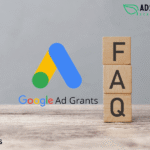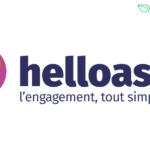Google Ads Grant Dictionary
Managing a Google Ad Grants account can be a challenging task, often requiring navigation through a continuous lexicon of new terms. This comprehensive Google Ads glossary can serve as a reference guide when you venture into the jargon of Google Ads. Knowing the language is essential to increase your reach and maximize your impact by effectively managing your own account. We have written this glossary for everyone, but we also had our friends in the nonprofit sector in mind, who work to maximize their Google Ad Grant. Feel free to bookmark this page and return to it whenever you need.
Dico Google Ads Grant
Ad Group
Ad groups exist within your campaigns. An ad group is a set of closely related keywords and the ads attached to them. Google Ad Grant accounts must always have at least two active ad groups in each campaign.
Ad Rank
How Google prioritizes the display of ads. This is determined by your cost-per-click (CPC) bid and your quality score. If interested, you can learn more about the internal workings of Google’s ad auction system. Google prioritizes paid ad accounts over grant accounts for auction space. Grant accounts are considered for placement only when there is remaining inventory available.
Ad Scheduling
The dates and times you want your ads to be shown. If you know most of your donations occur during work hours, you can use ad scheduling to pause your campaigns during evening hours when people are less likely to donate, focusing your budget during high-potential times.
Ad
The text ad displayed to users on the search engine results page after they search for a phrase matching a keyword in your account. Grant accounts must have at least two active ads in each ad group at all times.
Automated Rules
A tool that automatically updates your campaigns, ad groups, or keywords based on conditions you set. For example, you can create an automated rule to pause any keyword with a quality score of 2 or less (to ensure compliance with Google Ad Grants policies, although they now do this automatically for you). Automated rules can help minimize the time spent monitoring your account daily.
Bid Adjustments
A way to automatically increase or decrease your CPC bid based on various parameters (including time of day, day of the week, device, location, etc.). If you know the conversion rate for donations on mobile devices is very low, you can set a -50% bid adjustment for mobile devices in your donation campaign (indicating you are willing to spend 50% less for clicks from mobile users).
Broad Match
A type of keyword match that allows your ad to be shown whenever someone searches for that phrase or a similar phrase. For example, if you enter the keyword “volunteer opportunities” as a broad match keyword, it could match search queries like “volunteering opportunities” or “ways to volunteer.”
Campaign
Campaigns house ad groups. Budget, geographic targeting, language targeting, and other settings are all set at the campaign level. You will have multiple campaigns in your account. Here’s how to set up your first Google Ads Grants campaign.
Change History
A report that shows all changes made to your account, including the date and time they were made, as well as the email address of the user who made them. This is useful for identifying the cause of any unexpected performance changes.
Click
The engagement with your ad and the page it links to. Each time a user sees your ad and clicks on it, a click is recorded.
Click-Through Rate (CTR)
Total clicks / Total impressions. This tells us the percentage of people who clicked on an ad after it was shown to them. Generally, the higher, the better, as it indicates user interest in your ad. Ad Grant accounts are required to maintain a CTR of at least 5% at the account level.
Conversion
A key action taken on your website indicating user engagement (video views, email sign-ups, donations, etc.). You need to set up these actions as goals in your Google Analytics account. Conversions are crucial for understanding the value of traffic to your site and campaigns! Setting up conversion tracking and linking your Google Analytics account to your Ad Grant account allows you to see key conversion data in the Google Ads interface.
Cost Per Click (CPC)
Total cost of your clicks / Total number of clicks. What you actually pay for a click on your ad.
Daily Budget
The maximum amount you are willing to spend on a campaign in a given day. For Grant accounts, this is capped at around $329 per day.
Destination URL
The URL of the page on your site where you send users after they click your ad.
Display URL
The URL that is actually shown to users in your ad. This does not need to match the destination URL exactly, as long as you are not practicing bait-and-switch. For example, your destination URL might be mynonprofit.org/support/donate/recurring, and your display URL could simply be mynonprofit.org/donate.
Exact Match
A type of keyword match that tells Google to show the ad associated with the keyword only if a user types that phrase exactly. If you enter [volunteer opportunities] as an exact match keyword, it will only show when someone types volunteer opportunities into their Google search bar.
Geo-Targeting
The setting that allows you to choose where your ads are displayed. You can target as specifically as a congressional district or as broadly as an entire country. Grant accounts are required to include some level of geo-targeting and must target locations where their services are relevant (either the countries you work in, or the countries where you fundraise or have offices).
Google Analytics
Google’s free web analytics tool that allows you to see exactly what users do on your website. This is crucial for understanding how your Google Ads campaigns are performing.
Google Display Network (GDN)
The Google Display Network (GDN) contains over 2 million websites, videos, and apps where your ads can appear. Combined, the GDN reaches over 90% of all internet users and is a great place to show your ads to audiences that might be earlier in the buying and consideration process compared to those on Google Search. Note that grant-based ads are not eligible to be shown on the GDN.
Impression
An impression is counted each time your ad appears on Google’s search results page.
Keyword
Words or phrases you choose to associate with your ads. When a user searches for something on Google that matches a keyword in your account, the associated ad will appear in the search results.
Keyword Planner
A tool in the Google Ads interface used to find new keywords, estimate search volume, and other competition metrics.
Language Targeting
A key setting at the campaign level. Ensure that your keywords and ad text match the language you are targeting!
Limited by Budget
Sometimes you will see a campaign in your account marked as limited by budget. This simply means that the budget you set for the campaign is not enough to cover all the searches for the keywords you have chosen. This is not necessarily a bad thing, just an indication that you could potentially spend more in this campaign.
Low Search Volume
Sometimes you will see a keyword in your account marked as having low search volume. This means that the relevant keyword(s) do not have a large search history on Google. Again, this is not necessarily a bad thing, just an indication that these keywords will likely generate fewer impressions and clicks than other keywords.
Max CPC Bid
The maximum amount you are willing to pay for a click. For Grant accounts, this is capped at $2, unless you are using the Maximize Conversions bidding strategy.
Negative Keywords
A type of keyword match that excludes your ad from being shown for certain search terms. Negative keywords can help prevent your ads from being shown for irrelevant or inappropriate searches. For example, a nonprofit organ donation organization wanting to reach people searching for organ donations might include clothing or electronics as negative keywords to avoid having their ads shown to people looking for places to donate household items.
Phrase Match
A type of keyword match that allows your ad to be shown only when a specific phrase is included somewhere in a search. For example, adding “volunteer opportunities” as a phrase match keyword would allow your ads to be shown for volunteer opportunities in Paris or student volunteer opportunities, but not for volunteer positions near me.
Quality Score
A score from 1 to 10 that Google assigns to keywords to indicate the quality the keyword, ad, and landing page provide to users. The closer it is to 10, the better! Google’s ad ranking takes quality score into account when determining which ads to show, and typically the higher your quality score, the lower the CPC for a keyword. Grant accounts are required to maintain a quality score of 2 or more for all keywords in their account and risk suspension if they continue to bid on low-quality keywords.
Search Term or Search Query
The words or phrase a user actually typed into Google. These searches are then matched to the keywords you have included in your ad groups, and that’s how ads are chosen to be shown. In Google Ads, this report is called the search terms report. In Google Analytics, this is called the search queries report.
Sitelink Extension
An additional link found at the bottom of your ad that points people to additional pages on your website. These are set up by you and are a great way to take up more virtual real estate on the SERP. Google requires Grant accounts to have at least 2 unique sitelink extensions in their account.
Conclusion
This Google Ads glossary is a valuable resource for anyone looking to master the intricacies of online advertising. Whether you are a seasoned professional or a beginner, this information will help you optimize your campaigns to maximize your impact. For associations using the Google Ad Grant, this guide is particularly useful for making the most of this opportunity. By consulting it regularly, you will be able to better manage your campaigns and achieve your philanthropic goals. By understanding these key concepts and applying them wisely, you can turn your advertising campaigns into effective engines for promoting your cause and engaging your target audience.



